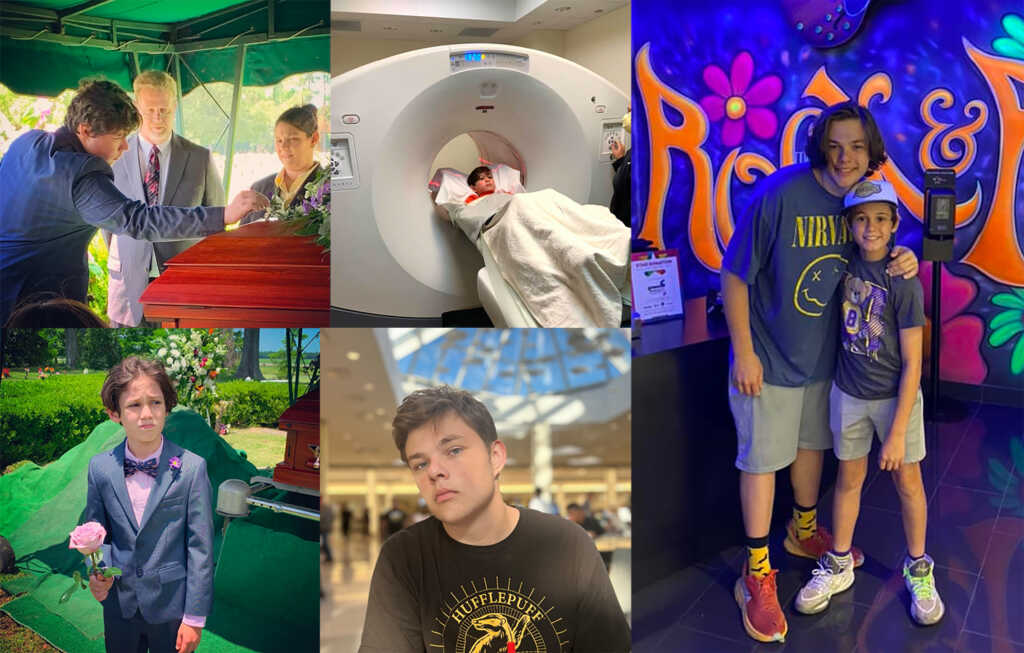
Mom, I’m So Sad All The Time: Ending The Stigma Begins At Home
In early 2021, both of my beautiful, amazing sons told their father and me that they were struggling with mental health issues. This was during a year that brought with it a cancer diagnosis for our 10 year old, more Covid chaos, the death of their grandfather (whom they loved dearly and saw almost weekly since their births) the death of their great-grandmother (whom they were also very close to), unrelenting anxiety and hopelessness for our 16-year old, plus the day-to-day struggles that life, middle school and high school brought with it.
As divorced co-parents, their father and I have made it clear that we are always open for them to come to us with these issues. As soon as they trusted us enough to do so, we did not minimize their concerns. We didn’t tell them to “suck it up” or give them any advice that began with the words “well at least you didn’t grow up in the 80s.” We took immediate action and that led to counseling, a relationship with an amazing doctor, and talking with them as often as needed. There is no room in either of our homes for stigma surrounding mental health struggles.
I don’t say this to receive any pats on the back. His father and I have both been impacted by family members losing their battle with depression and hopelessness, some of whom were still teenagers. When it came to our sons, we decided that we would always take things seriously.
I realize how fortunate we are to have health insurance for our children.
But bridging the gap between having insurance and using it are quite different. Although I’ve personally navigated the mental healthcare system since my own battles with cancer and depression in my 20s and postpartum depression in my 30s, it can still feel like a job in itself.


Here are a few tips that I’ve learned along the way:
1. Reach out to their teachers.
Sending a quick email and asking a few questions outside of the realm of homework and project due dates was met with great insight.
How’s he doing?
Does he seem to get along with the other kids?
Have you noticed anything unusual or out of the ordinary?
The teachers were happy to ease my fears or bring things to my attention that they’d noticed but wouldn’t have otherwise told me unless I’d asked. When my youngest was dealing with his cancer diagnosis, we made sure to call the main office and speak with the school counselor and other administrators. They were grateful to learn of this and were able to “watch out for him.” When we learned that the cancer had been contained to the lymph node and resolved by surgery, we were able to rejoice with the faculty and staff.
2. Talk to your pediatrician.
Most pediatricians keep a list of recommended mental healthcare providers and trusted counselors. I was able to call our pediatrician’s office and have that list emailed to me on the same day. As it turned out, I didn’t end up having to play a lot of “phone tag” with the providers because so many of them have websites where you can submit an appointment request.
3. Visit your insurance provider’s website
I used to dread the thought of logging in to my insurance provider’s website, but I was recently pleasantly surprised to see that navigating these sites has become much easier than it used to be. I was able to cross-reference the doctor’s list with our provider list pretty quickly.
4. Prioritize your own mental health.
If you don’t prioritize your own mental health, start now. In the midst of all that we have endured in the last few years, it will seem like our mental health can wait as we scramble to put the Covid years behind us and fully return to “normalcy.” But often, we underestimate what it takes to mentally heal.
The Bus and the Driver
The best way I’ve been able to explain this to my children is that if your body is the “bus,” your brain is the “driver.” If your mental health isn’t being taken care of or prioritized, i.e., if the driver is sick or is otherwise incapacitated, the bus will eventually crash or break down.
No matter how much the bus sparkles, how clean it looks, how steadily the engine purrs, how little the wheels squeak – remember to check on the driver, because in this case, your driver cannot be replaced. See a professional. Find a support group (even if it’s on Facebook, which can have an incredibly positive impact). Look into therapy. Research natural routes, if you are not comfortable taking medication, but take the time to check on “the driver.” You will not regret it.
Sometimes pain doesn’t just “go away.” As the years go by, the one thing I have come to realize is that time heals nothing.
Intention does.
LINKS:

















Thank you so much for writing this. I think often about how much has changed since I was “a sad kid,” talked out of what was probably clinical depression before anyone knew how to talk about it. It is scary to see the sadness and anger and alienation feelings in my own kiddo, and I have been advocating for better mental health options for our children with whoever will listen at our insurance. It’s frustrating. Discouraging sometimes. And worth it.
Anyway, just popping in to say I admire your stepping it up for your sons and really going into action. Destigmatize !
Thank you for the work you are doing in your own family to destigmatize! Every single effort is worth it. Keep advocating, and when you are exhausted, know that many of us are “on duty” nearby when you have reached your limit and need to rest. It’s so reassuring to know that we aren’t as alone as we think we are, we’ve just been socialized into silence. Keep speaking out!